
Life Matters | Mar 21,2020
With all the games that have been happening and the promise up for grabs from this year's world cup, my spirit was upbeat as I came out of the house. I made a decision to recoup the hours I had spent sitting in front of a television screen, establishing a routine with extended hours of a street walk.
After a long stretch one of the days last week, I soured my mood with strange thoughts.
The competition that now overrides the Olympics as the world's top show is in Qatar, unusual in the Cup's history. It is the first for an Arab country to host it. Asia hosted the FIFA World Cup twice; South Korea and Japan in 2002. The staggering 220 billion dollars spent (this estimate is growing by the day) to host the game, and the accompanying splendour, need to be considered as the latest reward to the mounting tributes under football's belts that envy the other games.
The game attracts people from different geographies than any other sport. The multinational corporations as a vector for their brands, making the game desired by television networks worldwide. A vast and endless level of mainstream and social media coverage attracts, at its peak, audiences that dwarf other sports. When it does, it gathers eyes and minds in acts of collective imagination like no other.
Almost all the World Cup competition players today are based in Europe, particularly from the English premier league, which is unparalleled in its global reach. No surprise that I started wondering if the World Cup is a continuation of the European leagues in another format, worried that respective countries' national teams are serving as a feed to the top leagues.
Favourably, as I continued my walk, these thoughts coincided, like a drop in the ocean, with what was happening in my usual route.
This time, a small neighbourhood football pitch where kids gathered was different as it included an adult coach who looked after them. I was delighted watching my neighbourhood kids involved in practising skills that demanded continuous improvement. They were chanting and communicating with each other with a palpable team spirit. I pondered why football holds such a peripheral place where it matters most here in the capital; many kids are denied the opportunity to play on the field.
It reminded me of my childhood when the city had division clubs lower than the number of Addis Abeba's districts, with a solid fan base. After the revolution in 1974, these clubs disappeared with the respective fan base that may take generations to re-establish. Indeed, there were also concerns that the clubs were considered feeder clubs to the few dominating the higher leagues then. However, it was when the formation of football clubs was shifted to factories and industrial sectors that the decision eclipsed competitions and fan bases, which are markers of an essential aspect of cosmopolitanism.
I thought that the more football came to our house through television, the more it stifled local ambitions. It does not entice the young to play football in the fields. Football clubs with solid fan bases guarantee enough resources to establish academies that enable talents that rise through the ranks. That exemplifies the awkward football players' merry-go-round with clubs playing in an empty stadium year-round.
It is time that the once shining historic neighbourhood football teams of the capital betake themselves to their historic fan-based past as it is part of an intangible urban heritage that encompasses customs, beliefs and practices.
Strong clubs create an environment for experts on subjects they know enough about, leading others with the best tools to succeed. Life intersects much with football as it is a school for rights and obligations with the rules of the game, learning from both wins and defeats, highs and lows, setting objectives and dedicating the self.
As football clubs get a fan base and sustainability, it helps the public never forget the sportspeople and ensure the future. A football field is like a giant movie screen, an art combining the strategies of chess, ballet, battle and playground; what a school football has always been. It is undoubtedly a school for democracy, with a game demanding competence and commitment to the rules as necessities. Let us enjoy the World Cup as we build academies that enable talents to rise.
PUBLISHED ON
Dec 04,2022 [ VOL
23 , NO
1179]


Life Matters | Mar 21,2020

Radar | Apr 03,2021

Commentaries | Nov 21,2020

Radar | Oct 31,2020

Fortune News | Dec 29,2018

Fortune News | Feb 16,2019

Editorial | Aug 31,2019

Covid-19 | Mar 21,2020

Life Matters | Apr 03,2021

Fortune News | Jan 05,2020

Dec 22 , 2024 . By TIZITA SHEWAFERAW
Charged with transforming colossal state-owned enterprises into modern and competitiv...

Aug 18 , 2024 . By AKSAH ITALO
Although predictable Yonas Zerihun's job in the ride-hailing service is not immune to...

Jul 28 , 2024 . By TIZITA SHEWAFERAW
Unhabitual, perhaps too many, Samuel Gebreyohannes, 38, used to occasionally enjoy a couple of beers at breakfast. However, he recently swit...

Jul 13 , 2024 . By AKSAH ITALO
Investors who rely on tractors, trucks, and field vehicles for commuting, transporting commodities, and f...

Jul 5 , 2025
Six years ago, Ethiopia was the darling of international liberal commentators. A year...

Jun 28 , 2025
Meseret Damtie, the assertive auditor general, has never been shy about naming names...

Jun 21 , 2025
A well-worn adage says, “Budget is not destiny, but it is direction.” Examining t...

Jun 14 , 2025
Yet again, the Horn of Africa is bracing for trouble. A region already frayed by wars...